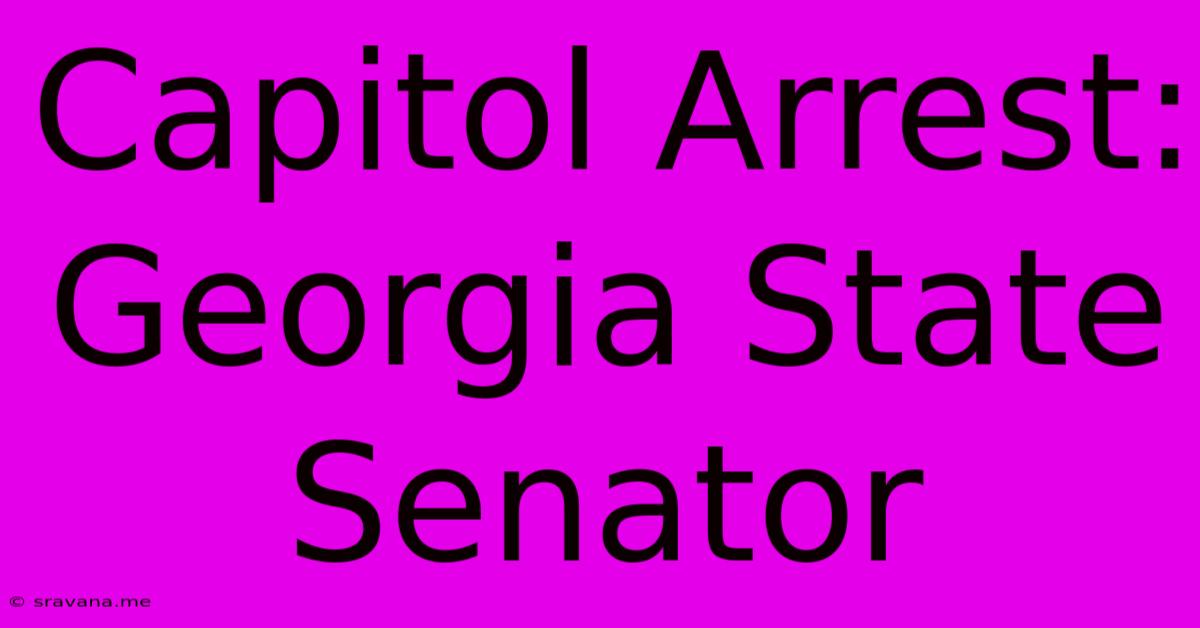Capitol Arrest: Georgia State Senator

Discover more detailed and exciting information on our website. Click the link below to start your adventure: Visit Best Website sravana.me. Don't miss out!
Table of Contents
Capitol Arrest: Georgia State Senator - Unraveling the Details and Implications
The arrest of a Georgia state senator on charges related to the January 6th Capitol riot sent shockwaves through the political landscape. This incident underscores the ongoing investigations into the events of that day and highlights the far-reaching consequences for those involved. This article delves into the specifics of the arrest, examining the charges, the senator's alleged role, and the broader implications for Georgia and national politics.
Who is the Arrested Senator? [Insert Senator's Full Name Here]
[Insert a brief biographical sketch of the senator, including their political affiliation, relevant committee assignments, and any prior controversies. This should be factual and neutral, avoiding subjective commentary.] This biographical information provides context and allows readers to understand the senator's background and position within the political system. It's crucial to establish this context early in the article to ensure readers understand the significance of the arrest.
The Charges: A Detailed Breakdown
The senator faces [List specific charges here, e.g., obstruction of an official proceeding, entering a restricted building or grounds, disorderly conduct on Capitol grounds]. Each charge carries specific penalties and requires a different level of proof in court. We will examine each charge in detail:
Obstruction of an Official Proceeding
This is arguably the most serious charge. The prosecution will need to demonstrate that the senator's actions intentionally hindered the certification of the electoral votes. This requires evidence showing a direct link between their actions and the disruption of the official process. [Insert details on legal precedent for this charge and any relevant legal arguments that are expected to be made by both the prosecution and the defense.]
Entering a Restricted Building or Grounds
This charge is relatively straightforward. Prosecutors must prove the senator knowingly entered a restricted area of the Capitol building without authorization. Security footage, witness testimony, and possibly cell phone location data could be used as evidence. [Discuss the potential evidence that may be presented in this regard].
Disorderly Conduct on Capitol Grounds
This charge focuses on the senator's behavior while on Capitol grounds. Evidence of disruptive actions, such as shouting, fighting, or inciting violence, would be central to this charge. [Include details about the potential evidence that might be used in this case and any legal interpretations surrounding this particular charge.]
The Senator's Alleged Role in the Capitol Riot
[This section should detail the allegations against the senator, citing specific sources. Avoid speculation and focus on verifiable facts. Include information from indictments, court documents, witness testimonies, and any other credible sources.] This section is crucial for clarity and transparency. It should paint a picture of the senator's alleged involvement without resorting to inflammatory language or making assumptions.
Examples of evidence to include (if available and verified):
- Security footage: Any video evidence placing the senator at the Capitol during the riot.
- Witness testimonies: Statements from individuals who claim to have seen the senator participating in illegal activities.
- Social media posts: Any posts made by the senator or others that suggest their involvement.
- Communication records: Texts, emails, or phone records that might reveal the senator's plans or communications with others involved.
Remember to clearly attribute all sources and avoid presenting hearsay as fact.
Political Implications and Public Reaction
The arrest of a sitting state senator has significant political ramifications. [Discuss the impact on the state legislature, the senator's party, and the ongoing political climate. Include quotes from political figures, news outlets, and other relevant stakeholders.] This section should analyze the impact of the arrest on various facets of the political landscape, addressing potential shifts in power dynamics, legislative processes, and public opinion.
Analyzing public reaction necessitates referencing polls, social media trends, and news coverage to provide a comprehensive understanding of the response to this event.
Legal Proceedings and Potential Outcomes
[Discuss the anticipated legal proceedings, including potential plea bargains, trial dates, and possible sentences. Provide a balanced overview of the possible outcomes and the legal strategies the defense might employ.] This section needs to provide a clear, neutral overview of the legal proceedings without predicting the outcome or offering personal opinions.
Long-Term Consequences and Lessons Learned
The arrest of the Georgia state senator serves as a stark reminder of the seriousness of the January 6th events and the ongoing investigations. [Discuss the potential long-term consequences for the senator, their career, and the broader political system. What lessons can be learned from this case?] This concluding section should synthesize the information presented throughout the article and offer insightful reflection on the broader implications of this event. It should avoid overly conclusive statements and acknowledge the ongoing nature of the situation.
Remember to replace the bracketed information with specific details relevant to the arrested senator and the ongoing legal proceedings. Maintain a neutral and objective tone throughout the article, relying on verified facts and credible sources. Thorough research and accurate reporting are paramount to creating a reliable and informative article.

Thank you for visiting our website wich cover about Capitol Arrest: Georgia State Senator. We hope the information provided has been useful to you. Feel free to contact us if you have any questions or need further assistance. See you next time and dont miss to bookmark.
Also read the following articles
| Article Title | Date |
|---|---|
| Usps Ups After The Sure Post Contract | Jan 22, 2025 |
| Joan Plowrights Life Images And Stories | Jan 22, 2025 |
| Joan Plowright Dies Acting Legends Legacy | Jan 22, 2025 |
| New Ups Sure Post Key Changes Explained | Jan 22, 2025 |
| Booed Collins Thanks Fans For Push | Jan 22, 2025 |
